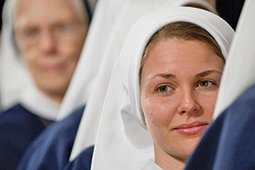The future of women in the Church
From my first intervention at the recent Synod of Bishops the media took only the proposal to study the possibility of ordaining women to the permanent diaconate. In fact my discourse went further. I referred to n. 30 of the Instrumentum laboris, which focuses on the role of women in the family and includes the following affirmation: “the status of women in the world differs to a notable degree, primarily as a result of cultural factors”. A recent study of the World Family Organization confirms this judgement, emphasizing that about a third of the women in the world are victims of conjugal violence. In the face of this I wanted to ask the Synod Fathers to renew the Church’s commitment to encouraging equal dignity between men and women.
Later, my intervention proposed that this commitment should also concern the Church’s institutional life. I wanted to delve more deeply into n. 30 of the Instrumentum laboris where it says: “A contributing factor in acknowledging the determining role of women in society could be a greater appreciation of their responsibility in the Church, namely, their involvement in the decision-making process, their participation – not simply in a formal way – in the governing of some institutions; and their involvement in the formation of ordained ministers”.

I formulated three suggestions in this regard: to study the possibility of ordaining women to the permanent diaconate; to permit married couples to speak during homilies in Mass to bear witness to the connection between the proclaimed Word and their lives as spouses and parents; to recognize the equal ability of women to take on decision-making roles in the Church, appointing them to posts that they could occupy in the Roman Curia and in our diocesan curias.
I recognize that a Synod on the Family is not the most suitable place in which to discuss structures of collaboration in the Church. Yet the question is important, indeed, urgent. I would like to make the most of the space I am permitted on this page to linger on the question of the consultation of women in the Church and above all in the Vatican.
It is a pleasure to find women among the participants in the less formal meetings – congresses, conferences, study meetings – organized by various dicasteries. More and more women are serving as speakers. I recently noticed this at several meetings on the subject of human trafficking where the women’s contributions were especially appreciated. However, fewer women are seen appointed in permanent structures. It is a pleasure too that today the International Theological Commission is including five women among its 30 members, while at the time of its foundation in 1969 there were none. And one cannot but applaud the Pontifical Council for Culture for having set up a consultative committee of women which can express its opinion on the topics and projects examined by the Council. But can one say as much of all the dicasteries? Wouldn’t it be the case of starting a serious reflection in this regard?
One group that could help to bring this task to conclusion is the International Union of Superiors General (UISG). A great many of its members have acquired skills and have had very important experiences. Hasn’t the time come to open the door to them for a closer collaboration at all the levels of ecclesial life?
Here is an example, a lay member of a religious institute took part in the latest Synod as a Synod Father. Then a question was raised: why not a woman, a member of a religious congregation? What would prevent the reservation at the Synodal Assembly of the UISG of posts similar to those reserved at the Union of Superiors General? The episcopal ministry cannot but be enriched by listening to the charismatic voice in the Church.
One might thus think of inviting the UISG to send some of its members to the meetings of the cardinals’ consistories in the capacity of observers or counsellors, and even to the preparatory meetings for a conclave. These encounters, extremely important for the Church’s life, also concern Christ’s women faithful. We have everything to gain by inviting them to take part in such meetings and the witness offered to the world would be even stronger. Likewise, all the world’s Bishops’ Conferences should feel honoured to invite representatives of the associations of female religious communities as observers and participants in their general assemblies.
Without effecting great structural changes, let us accept Pope Francis’ invitation to elaborate in our Churches a true synodality in which all voices are heard, those of women too. In this way we could come a little closer to realizing the vision of the Second Vatican Council: “And so amid variety all will bear witness to the wonderful unity in the Body of Christ: this very diversity of graces, of ministries and of works gathers the sons of God into one” (Lumen gentium, n. 32).
Paul-André Durocher
- Vatican's deputy official for religious to lead Indianapolis archdiocese
- The future of Consecrated Life in the UK and Europe
- Secularized societies, ageing religious affect Church in East Asia
- Pope tells sisters the church needs them, they need the church
- Vatican's doctrinal head lambasts US sisters for disobedience
- Last Seminar of 2015 for Consecrated men and women.
- Pope tells sisters the church needs them, they need the church
- US nuns’ relief that the Vatican’s investigation fizzled out
- Vatican cardinal criticises the way LCWR reform was handled
- Consecrated Life is precious gift to the Church and the world.


 Votes : 0
Votes : 0









